
The National Interest Foundation Newsletter
Issue 305, October 10, 2025
Welcome to our NIF Newsletter. In this week’s edition, we provide analysis regarding a recent Washington Post poll which found that many American Jews sharply disapprove of Israel’s conduct in Gaza, while also looking into the unrest in Morocco and the stability of the government.
Editor: Bassam Tarbush
Washington Post Poll Finds That Many American Jews Sharply Disapprove of Israel’s Conduct in Gaza
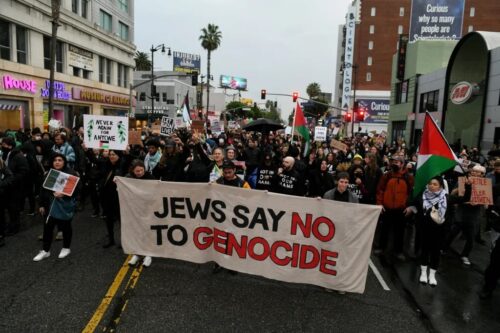
A recent poll conducted by The Washington Post has found that many American Jews are strongly critical of Israel’s actions in Gaza. The survey – which was taken in early September and published this week as the Gaza War surpassed its two-year mark – sheds light on several notable areas of denunciation regarding Israel’s military conduct, its government, and its policies. The poll is merely the latest one demonstrating the evident trend of growing disapproval toward Israel, something that has manifested both domestically and internationally across a wide array of demographic groups. Thus, The Washington Post’s findings on the subject are part of a broader shift in public opinion that has been well documented by multiple reputable research institutions, pollsters, human rights organizations, and others.
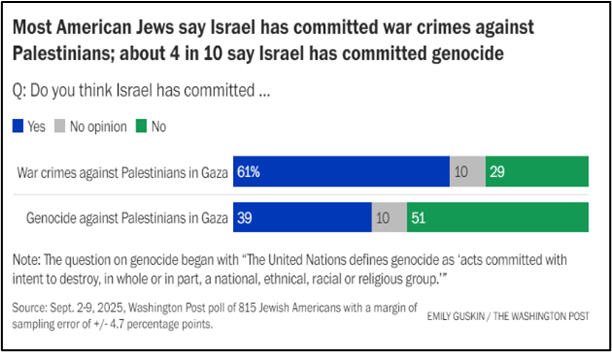
One of the poll’s most significant findings was that an overwhelming majority of American Jews believe that Israel has committed war crimes against Palestinians in Gaza. The margin of difference on this question was a whopping 32%, with 61% expressing that this was the case compared to only 29% who stated that it was not. Additionally, nearly 4 in 10 respondents even contended that Israel has committed the heinous crime of genocide against Palestinians in Gaza. This is a noteworthy proportion and falls in line with the ever-increasing number of human rights organizations, United Nations bodies, civil society groups, and genocide scholars who have reached the same determination – particularly in recent months. The list includes a plethora of reputable groups such as Amnesty International, Human Rights Watch, the International Association of Genocide Scholars, Jewish Voice for Peace, Oxfam, B’Tselem, Doctors Without Borders, and many more.
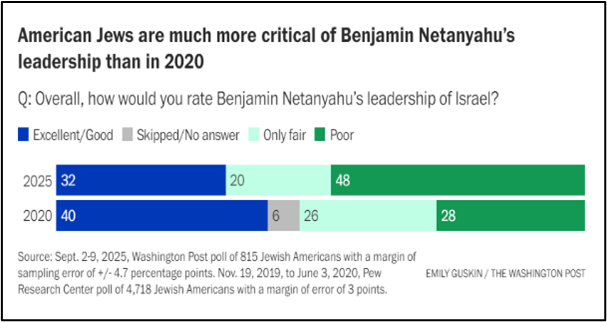
On top of the high levels of condemnation towards Israel’s actions in Gaza, there was also a striking uptick in criticism regarding Israeli Prime Minister Benjamin Netanyahu’s leadership of the country. Back in 2020, 40% of survey respondents in a Pew Research Center poll rated his leadership as “excellent/good” while a combined 54% rated it either “only fair” or “poor.” Now, in 2025, the “excellent/good” number has dropped to 32%, the “only fair” number sits at 20%, and a near flat-out majority of 48% deem his leadership to be “poor” – a huge 20% increase from only 5 years ago. In total, the combination of the current “only fair” and “poor” figures leave 68% of respondents with a negative perception of Netanyahu – that is more than two-thirds of the total number of those who took part in the survey.
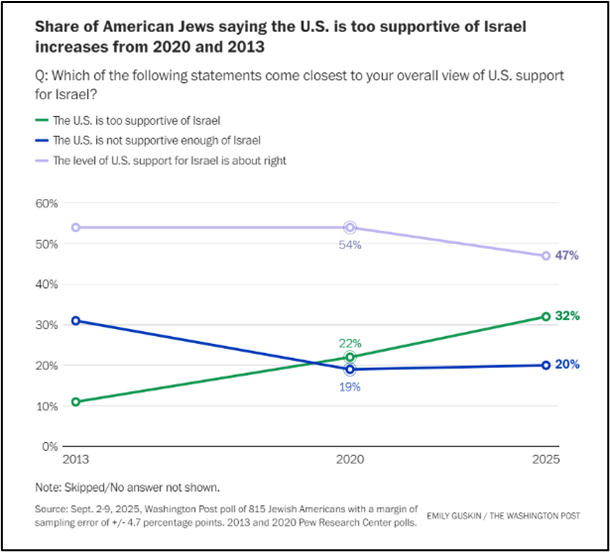
The poll also revealed a substantial increase in American Jews who believe that the United States is too supportive of Israel. Compared to only 5 years ago in 2020, this percentage has jumped 10 percentage points – from 22% to 32%. Furthermore, when looking back a bit further to data from 2013, it is clear that this figure has continued to significantly climb over the past 12 years – from just above 10% to 22% and now to 32%. During this same time period, the proportion of American Jews who contend that the United States is not supportive enough of Israel has dropped by more than 10 percentage points as well and now sits at only 20%. Additionally, the fact that there has also been a dip in those who feel that the level of U.S. support for Israel is about right – from 54% in 2020 to 47% in 2025 – which comes in conjunction with the rise in the sentiment that the United States is too supportive of Israel, further crystalizes the evident growing belief that the level of American support for Israel is not appropriate overall.
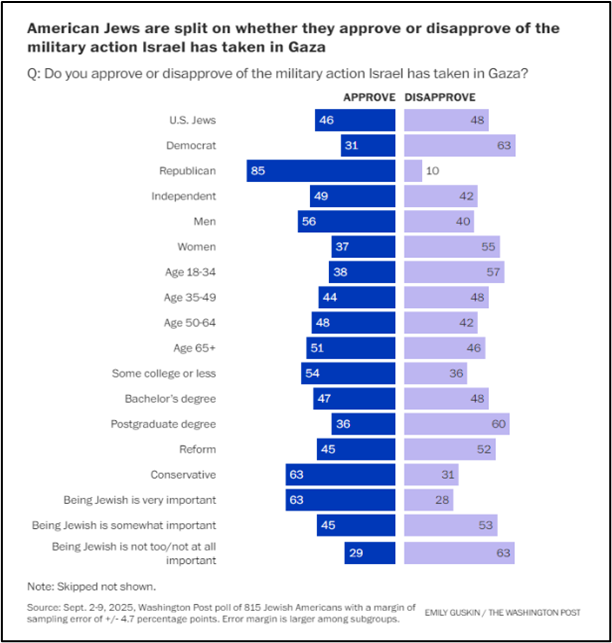
Lastly, The Washington Post poll highlighted that an undeniable distinction exists in American Jews’ views of the Gaza War based on factors such as partisanship, age, gender, and education. Democrats were much more critical of Israel’s military actions in Gaza, with 63% disapproving compared to only 31% who approved. On the flip side, among Republicans, 10% disapproved while 85% approved. There was a notable age discrepancy as well, as younger American Jews disapproved of Israel’s military actions at higher levels than their older counterparts. As a whole, women were also more critical of Israel’s actions than men – with 55% of women survey respondents disapproving while an almost identical percentage (56%) of men expressed their approval. One final trend in the data that was apparent involved education – as those with higher education levels were in totality much more critical of Israel’s military actions in Gaza.
Unrest in Morocco and the Stability of the Government
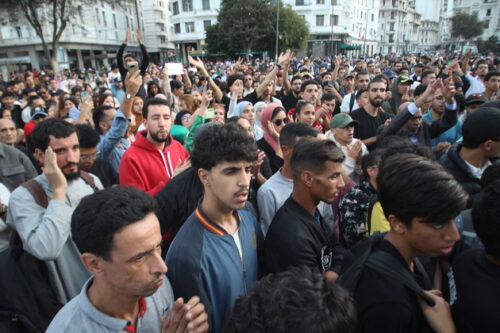
Since September, large-scale protests have emerged across Morocco seeking widespread government reform in areas such as public services, healthcare, education, and what are viewed as the country’s misplaced development priorities. The youth-led movement has come to the surface as a result of discontent with the state of the economy, coupled with backlash regarding focused investment on infrastructure for international sporting events over improvements in government and public services. Frustrations have grown regarding degraded health and education services in the country while the government is deemed to instead be prioritizing upgrading its sports infrastructure ahead of its 2030 FIFA World Cup joint hosting duties with Spain and Portugal. Seemingly taking inspiration from recent Gen Z protests in countries like Nepal and Indonesia, young Moroccans have been coordinating many of the demonstrations and are demanding that authorities act with the same urgency to address issues impacting ordinary citizens as they have towards co-hosting the 2030 FIFA World Cup. All told, the protests are the largest that Morocco has seen since the 2011 Arab Spring, which ultimately led to constitutional reforms limiting the power of the monarchy and providing more authority to the country’s executive and legislative branches.
Organized by anonymous collectives known as GenZ 212, the group was first founded on the online platform Discord in mid-September, with members calling for protests at the end of that month. The movement was originally triggered by outrage over what has been called “the hospital of death” in the coastal Moroccan city of Agadir – the Hassan II Hospital. Demonstrations had already been taking place around the hospital for several weeks due to allegations of patient mistreatment, medical negligence, lack of hygiene, and an array of patient deaths. After gaining momentum online, the GenZ 212 Discord server put out a poll that led to the first protests in late September. The group has explicitly called for non-violent protests and has publicly disavowed any association with acts of violence or vandalism. GenZ 212 has also been operating in a manner which has seen it regularly hold discussions on Discord that conclude with votes on different actions to take next.
The emergence of the youth-led protest movement in Morocco came as a surprise to many as a result of its speed of mobilization, rapidness, and wide reach. It has grown to attract hundreds of thousands of Moroccans – both on the streets and online. Additionally, analysts and regional experts point to how the youth have often been perceived as disengaged and thus the movement has countered this narrative by demonstrating a strong sense of social and political awareness among younger citizens. Much of GenZ 212’s discontent has been directed at current Moroccan Prime Minister Aziz Akhannouch, who has been scrutinized for potential conflicts of interest between his personal business dealings and state projects. In recent days, the movement has begun calling for a boycott of all companies associated with Akhannouch, in addition to his resignation.
Public figures and other citizens are urging Moroccan King Mohammed VI to respond to the social movement by initiating in-depth reforms. Signatories to an open letter on Wednesday including journalists, activists, and human rights defenders have called for the launch of a process of constitutional reform. They have also implored the state to make healthcare, education, and employment its top priorities. Protesters themselves sent a letter directly to the palace, seeking a dismissal of the prime minister, the release of political detainees, and the creation of a forum to hold corrupt officials accountable. Given the complex nature of the constitutional monarchy governmental system in Morocco, King Mohammed VI is relied upon to enact important reforms in order to address societal grievances. Back in 2011, the king responded positively to Arab Spring demonstrations, paving the way for Moroccan society to experience what observers referred to as “an evolution rather than a revolution.” Due to this however, the reforms initiated in 2011 make it difficult for King Mohammed VI to simply dissolve the government, and therefore, a wider consensus is required consisting of action from the country’s parliament. Moroccan King Mohammed VI was slated to address parliament today.
Ultimately, experts have forecasted that the ongoing youth-led movement will reshape the political climate in Morocco and help crystalize the government’s priorities ahead of general elections next year. With the country’s track record of effectively managing crises though, it is unlikely that the movement will evolve into a more transformative revolution and instead, may result in some concessions from the government on specific social and economic issues.
